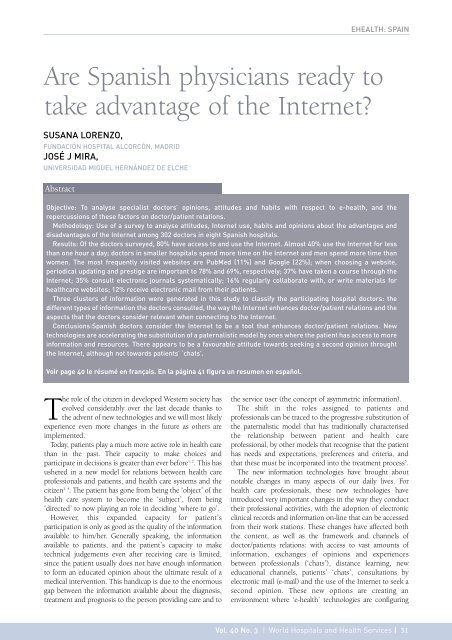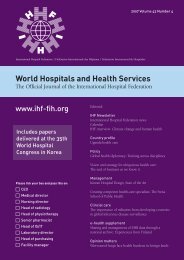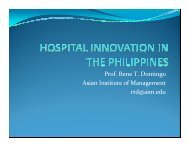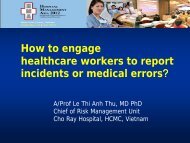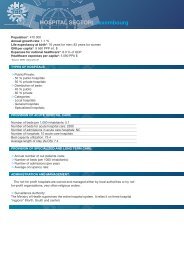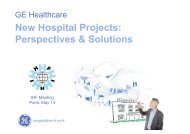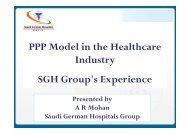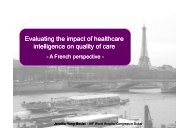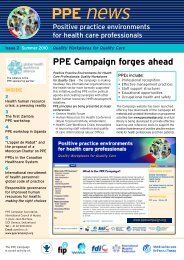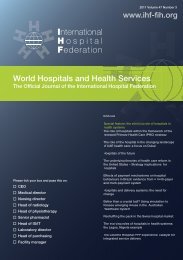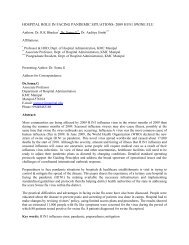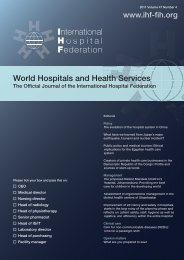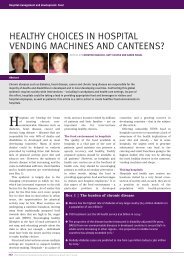World Hospitals and Health Services - International Hospital ...
World Hospitals and Health Services - International Hospital ...
World Hospitals and Health Services - International Hospital ...
Create successful ePaper yourself
Turn your PDF publications into a flip-book with our unique Google optimized e-Paper software.
EHEALTH: SPAIN<br />
Are Spanish physicians ready to<br />
take advantage of the Internet?<br />
SUSANA LORENZO,<br />
FUNDACIÓN HOSPITAL ALCORCÓN, MADRID<br />
JOSÉ J MIRA,<br />
UNIVERSIDAD MIGUEL HERNÁNDEZ DE ELCHE<br />
Abstract<br />
Objective: To analyse specialist doctors’ opinions, attitudes <strong>and</strong> habits with respect to e-health, <strong>and</strong> the<br />
repercussions of these factors on doctor/patient relations.<br />
Methodology: Use of a survey to analyse attitudes, Internet use, habits <strong>and</strong> opinions about the advantages <strong>and</strong><br />
disadvantages of the Internet among 302 doctors in eight Spanish hospitals.<br />
Results: Of the doctors surveyed, 80% have access to <strong>and</strong> use the Internet. Almost 40% use the Internet for less<br />
than one hour a day; doctors in smaller hospitals spend more time on the Internet <strong>and</strong> men spend more time than<br />
women. The most frequently visited websites are PubMed (11%) <strong>and</strong> Google (22%); when choosing a website,<br />
periodical updating <strong>and</strong> prestige are important to 78% <strong>and</strong> 69%, respectively; 37% have taken a course through the<br />
Internet; 35% consult electronic journals systematically; 16% regularly collaborate with, or write materials for<br />
healthcare websites; 12% receive electronic mail from their patients.<br />
Three clusters of information were generated in this study to classify the participating hospital doctors: the<br />
different types of information the doctors consulted, the way the Internet enhances doctor/patient relations <strong>and</strong> the<br />
aspects that the doctors consider relevant when connecting to the Internet.<br />
Conclusions:Spanish doctors consider the Internet to be a tool that enhances doctor/patient relations. New<br />
technologies are accelerating the substitution of a paternalistic model by ones where the patient has access to more<br />
information <strong>and</strong> resources. There appears to be a favourable attitude towards seeking a second opinion throught<br />
the Internet, although not towards patients’ ‘chats’.<br />
Voir page 40 le résumé en français. En la página 41 figura un resumen en español.<br />
The role of the citizen in developed Western society has<br />
evolved considerably over the last decade thanks to<br />
the advent of new technologies <strong>and</strong> we will most likely<br />
experience even more changes in the future as others are<br />
implemented.<br />
Today, patients play a much more active role in health care<br />
than in the past. Their capacity to make choices <strong>and</strong><br />
participate in decisions is greater than ever before 1, 2 . This has<br />
ushered in a new model for relations between health care<br />
professionals <strong>and</strong> patients, <strong>and</strong> health care systems <strong>and</strong> the<br />
citizen 3, 4 . The patient has gone from being the ‘object’ of the<br />
health care system to become the ‘subject’, from being<br />
‘directed’ to now playing an role in deciding ‘where to go’.<br />
However, this exp<strong>and</strong>ed capacity for patient’s<br />
participation is only as good as the quality of the information<br />
available to him/her. Generally speaking, the information<br />
available to patients, <strong>and</strong> the patient’s capacity to make<br />
technical judgements even after receiving care is limited,<br />
since the patient usually does not have enough information<br />
to form an educated opinion about the ultimate result of a<br />
medical intervention. This h<strong>and</strong>icap is due to the enormous<br />
gap between the information available about the diagnosis,<br />
treatment <strong>and</strong> prognosis to the person providing care <strong>and</strong> to<br />
the service user (the concept of asymmetric information).<br />
The shift in the roles assigned to patients <strong>and</strong><br />
professionals can be traced to the progressive substitution of<br />
the paternalistic model that has traditionally characterised<br />
the relationship between patient <strong>and</strong> health care<br />
professional, by other models that recognise that the patient<br />
has needs <strong>and</strong> expectations, preferences <strong>and</strong> criteria, <strong>and</strong><br />
that these must be incorporated into the treatment process 5 .<br />
The new information technologies have brought about<br />
notable changes in many aspects of our daily lives. For<br />
health care professionals, these new technologies have<br />
introduced very important changes in the way they conduct<br />
their professional activities, with the adoption of electronic<br />
clinical records <strong>and</strong> information on-line that can be accessed<br />
from their work stations. These changes have affected both<br />
the content, as well as the framework <strong>and</strong> channels of<br />
doctor/patients relations: with access to vast amounts of<br />
information, exchanges of opinions <strong>and</strong> experiences<br />
between professionals (‘chats’), distance learning, new<br />
educational channels, patients’ ‘chats’, consultations by<br />
electronic mail (e-mail) <strong>and</strong> the use of the Internet to seek a<br />
second opinion. These new options are creating an<br />
environment where ‘e-health’ technologies are configuring<br />
Vol. 40 No. 3 | <strong>World</strong> <strong><strong>Hospital</strong>s</strong> <strong>and</strong> <strong>Health</strong> <strong>Services</strong> | 31


